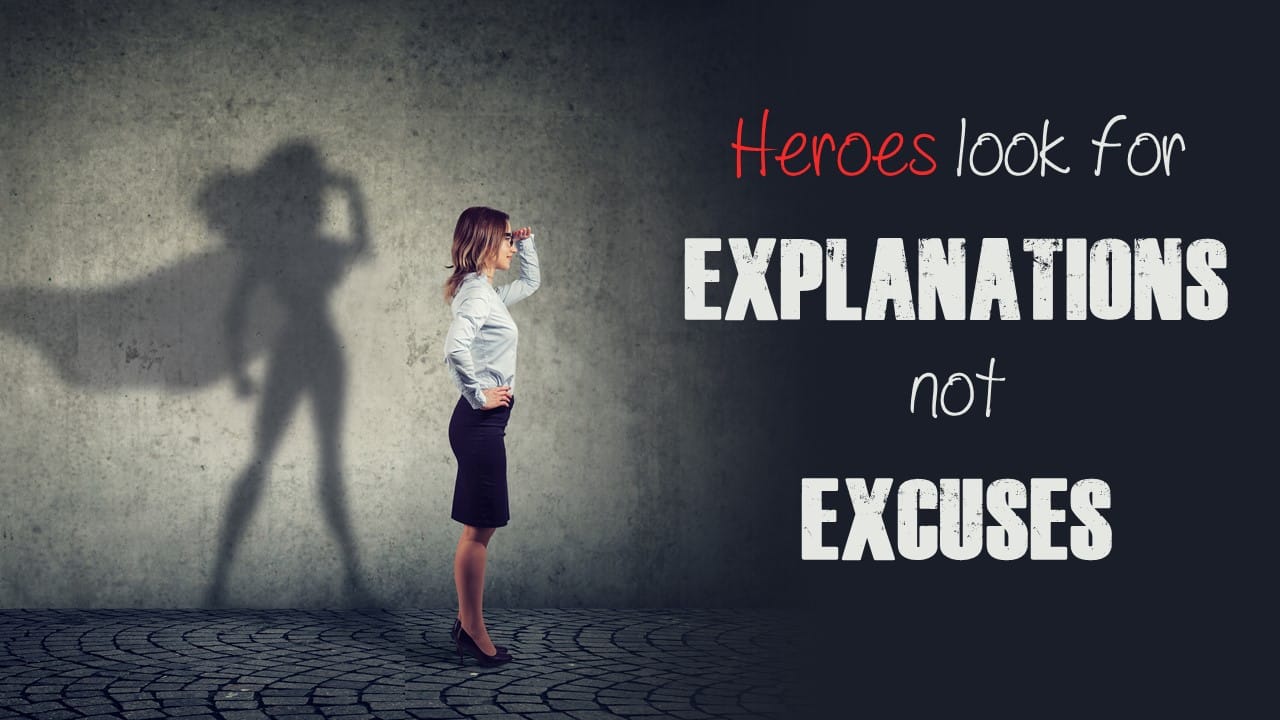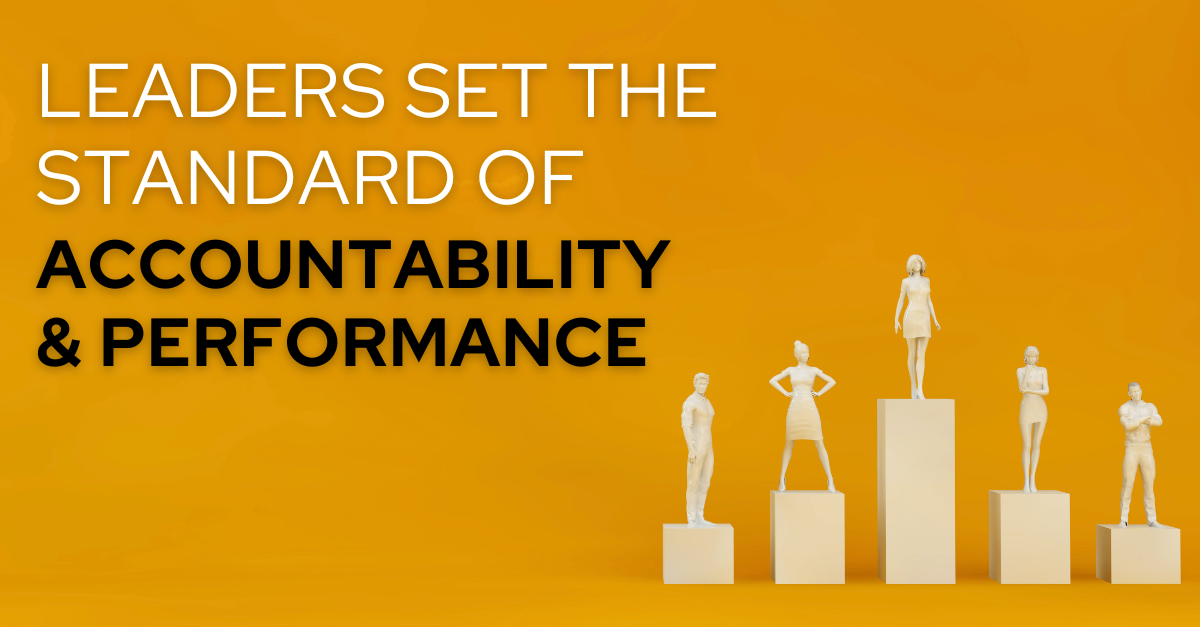Everybody loves a great story. Our favorite stories often involve a protagonist who is dealt a bad hand but who manages to rise victoriously above their circumstances because of their remarkable character and unconquerable spirit. These are stories of a hero’s journey, and are stories that many famous leaders have lived.
In our everyday life, however, we don’t often see these heroic stories unfold. This is partly because it’s hard to notice the heroic journeys being played out around us that take decades to unfold. But I believe another reason why we don’t see very many heroes is because at the time those pivotal moments come in our lives when we could become a hero, most of us have not built the habits necessary to respond to our challenges in heroic ways.
We build our capacity to act more and more like a hero by the way we respond to the daily challenges that aren’t necessarily our fault. When those times come, we basically have two options. We can either try to excuse ourselves from the problem, or we can look for explanations to help solve the problem. Learning to be a hero begins by focusing on what you can do to overcome your challenges instead of focusing on what you can’t do.
We build our capacity to become a hero by the way we respond to the daily challenges that aren’t necessarily our fault.
The Difference Between Explanations and Excuses
Some people in leadership positions believe that they are teaching others to be accountable for problems by slamming their fist on their desk and barking “Don’t bring me excuses, bring me solutions!” That’s not leadership and it definitely won’t create a culture of accountability. What that is communicating is “I don’t care about you, I only care about results.” True leaders care as much about the people they lead as they do about the results their people produce.
True leaders care as much about the people they lead as they do about the results their people produce.
According to global CEO coach, Sabina Nawaz, the “only bring me solutions” approach often prevents problems from surfacing until they’re full-blown crises. Nawaz describes a client who used to lose his temper and raise his voice any time his team members brought problems to light. Not surprisingly, the CEO’s employees stopped bringing him problems, leaving him blind to potential issues. Instead, leaders who model accountability teach people that problems can be helpful because they provide an opportunity to learn and become better.
They key to surfacing problems in a way that doesn’t sound like an excuse is to bring them forward with the intention of being part of the solution.
An excuse is a justification for poor behavior and unacceptable results. An excuse is something someone offers in exchange for bad results in an attempt to extricate themselves from the debacle. “I can’t deliver what you want” the thinking goes, “so let me offer you some excuses instead. That should satisfy you.”
A person who provides an excuse has no intention of mitigating the unacceptable results. They are essentially washing their hands of the situation and saying “I’m out.” An explanation, on the other hand, is an analysis of the problem with the intent to salvage the situation as best they can and turn things around if possible. Leaders encourage the people around them to bring forward explanations for problems so the team can use them to find solutions or to prevent the same problem from recurring.
Giving excuses for bad results is like losing someone else’s dog and bringing them back the broken leash expecting that to appease the dog’s owner. “The leash broke” they say, “and your dog ran away. I hope you find your dog. See you later.” In this case, the broken leash is being used as an excuse.
On the other hand, after an accountable person tells the dog’s owner that the leash broke and their dog ran away, she continues, saying, “I have called three of my friends to come help look for your dog. I need you to come help us and could you possibly ask your husband to start making flyers for us to begin posting if we don’t find your dog by the end of the day.” In this instance, the broken leash is used as an explanation because it leads to a solution.
The difference between an excuse and an explanation is how you intend to use it. If you think that providing a reason for unacceptable results absolves you of accountability, then its an excuse. If providing reasons for poor results is used as the starting point to find a solution which the person using it intends to be part of, then its an explanation.
The difference between an excuse and an explanation is how you intend to use it.
Excuse-making has become almost a sport in some organizations. No matter what problem is thrown at some people, they can find a reason why it’s not their fault. Excuses like:
“Traffic was brutal today.”
“I didn’t have time to get that done.”
“I told him to do it so I assumed it got done properly.”
There may be an element of truth in each of these statements, but they are excuses because they don’t acknowledge what could have been done to mitigate the undesirable outcomes, nor do these statements imply that the person providing them intends to be part of the solution.
Most people in leadership positions know how maddening it is to be offered excuses instead of results. But is it possible that those who report to you are learning this behaviour from you?
Exercising Accountability Builds Hero Habits
I once read a story about two fast food restaurant CEO’s who were interviewed by the same news reporter. The reporter summed up his two interviews with the following commentary “I had a conversation recently with the CEO of [ABC] Corporation, and the entire conversation revolved around how the company is being pounded by the economy. Their CEO spent our entire conversation complaining and crying about their challenging environment. My conversations with their biggest competitor were dramatically different. As I spoke with their CEO, he did not see any problem with the environment in which they are operating. Their entire organizational focus centers around what else they can do to create growth opportunities. That’s why their business is thriving.” The reporter then concluded with this observation. “The shareholders of these companies don’t care how the food tastes. They care about how the leaders are leading their companies to achieve results in spite of the current economy.”
To the first CEO’s credit, when he was confronted with the reporter’s reproval, he publicly acknowledged his mistake and vowed to stop offering excuses. Instead, he encouraged his team to focus on what the company can do to improve results, instead of on what they can’t do. This courageous act of looking in the mirror marked a major turning point for the company.
Building personal accountability increases your capacity to be a leader and respond to your challenges in heroic ways. Think of the following three practices as exercises to prepare you to become a hero when those pivotal moments come in your life.
- Look For Explanations, Not Excuses. Make a list of all the factors that contributed to your problems, and don’t stop until you’ve listed all the things you did or didn’t do that may have contributed to your problem.
- Reward People Who Surface Problems. Never punish people for bringing forward problems by labeling them as “troublemakers.” If people don’t feel safe to bring problems to your attention, you’ll stop hearing about them. Then you will be blindsided later when the problems are much harder to deal with and when it’s become more difficult to diagnose the root cause. Instead, teach others that problems are opportunities to become better. Publicly praise people who bring forward problems and, when necessary, coach them how to turn their excuses into explanations.
- Model Being Part of the Solution. If you want others to come to you with more solutions, model what being part of the solution looks like. This includes being willing to invest the time necessary to teach people how to find their own solutions when they come to you with problems instead of solving it for them or unsympathetically saying “Don’t bring me excuses, bring me solutions.”
Heroes rise above their challenges to accomplish great things. So do great leaders. Exercising personal accountability is how we build our capacity to act more and more like a hero by the way we respond to the daily challenges that aren’t necessarily our fault.
_______________________________________________________________________________________
For more on this topic, check out my Creating Accountability Workshop Series:








6 Responses
Ok, sold! I want a copy of that book when you get it published. What I have read here makes so much sense and is completely in-line with the kind of leader I strive to be as well as the type of leaders that I want to work around. Great Job!
Great Russ – it’s nice to hear that others agree with my perspective on leadership. Don’t worry, if you’re getting my articles, then you will be notified when my next book is published. I would expect that to happen in October or November.
Michael, this is a great post. Most of us as leaders are faced with this situation repeatedly with staff, and your analysis and solution are excellent advice! Very often it does turn out that we are either creating or perpetuating the situation by our own behavior. Thanks very much.
Hi Larry – great to hear from you! Glad you enjoyed the post. Thanks for taking the time to comment. I appreciate the feedback.
From what I have read here, this book ought to be required reading for everyone in or grooming themselves to be in, leadership roles.
Thank you Thank you Thank you !
Hi Lisa – thanks for your encouraging words! Yes, I am getting close to completing the book on Personal Accountability and I hope those in leadership positions, and aspiring leaders, read it and apply the principles therein.